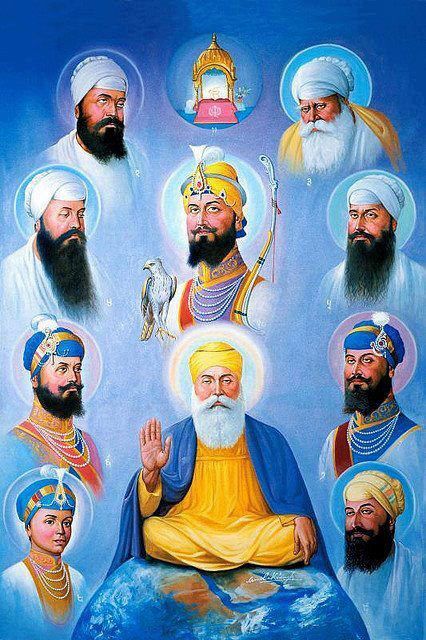Sikhism – The word Sikh (pronounced “sickh”) means ‘disciple’ or ‘learner.’ The Sikh religion was founded in Northern India in the fifteenth century by Guru Nanak Dev Ji and is distinct from Islam and Hinduism. Sikhism is monotheistic and stresses the equality of all men and women. Sikhs believe in three basic principles; meditating on the name of God (praying), earning a living by honest means as well as sharing the fruits of one’s labor with others. Sikhism rejects caste and class systems and emphasizes service to humanity.
In 1699, the tenth and last living Sikh Guru, Guru Gobind Singh, summoned his followers to the town of Anandpur in Punjab; over 80,000 came. According to history, Guru Gobind Singh appeared before his people, flashed a naked sword, and demanded a head. He repeated his call until five Sikhs volunteered. These five individuals came from different parts of India and from different castes. To these five, and subsequently to many others on that historic day, Guru Gobind Singh bestowed a new discipline, a creed to his Sikhs.
History and Beliefs
The almost 25 million Sikhs worldwide constitute the fifth largest religion in the world. Despite almost a million Sikhs living in North America (USA and Canada), Sikhs are often confused as Arabs or Muslims. Sikhs arrived in North America in 1897 and played a pivotal role in the opening of the West and construction of the Panama Canal in 1904. In 1906, Sikhs established their first gurdwara, or place of worship, in the United States. 700,000 Americans and Canadians are Sikh and nearly every major city has a Sikh place of worship and community center.
The Sikh faith is five hundred years old. Guru Nanak, the founder of Sikhism, taught a message of love. He spoke of a universal God, common to all mankind, not limited to any religion, nation, race, creed, color, or gender. The Sikh religion is strictly monotheistic, believing in one supreme Creator, free of gender, absolute, all-pervading, and eternal. Sikhism views lfe not as a fall from grace, but a unique opportunity to discover and develop the divinity in each of us. Human rights and justice form a cornerstone of Sikh belief, and Sikh history features countless examples of Sikh Gurus and their followers making tremendous sacrifices for the cause of religious freedom and justice. More recently, Sikhs have been some of the most highly decorated soldiers of the British armed services during both World Wars. They played a significant role in the memorable battles of El Alamein in the Burma-China front and also in the allied assault in Italy. In India’s struggle for independence from the British, over two-thirds of all the Indians who were sentenced to life imprisonment or death were Sikh. This is in spite of the fact that Sikhs form less than two percent of India’s population
The Gurdwara
The Sikh place of worship, or Gurdwara, is more than a place of worship. It has historically served as a refuge for the homeless and the destitute. Gurdwaras usually display the Nishan Sahib, a saffron-colored triangular flag bearing the khanda, the symbol of the Sikh faith. Visitors, irrespective of their religion, are offered shelter, comfort, and food. The prerequisites for entering a Gurdwara are removing shoes and covering one’s head with a handkerchief, scarf, or other cloth.
In a Gurdwara, no special place or seat may be reserved or set aside for any dignitary, as all are considered equals. The service consists of singing of the liturgy, as well as the exposition of Sikh history, tradition, and theology. Non-Sikhs are always welcome. Sikh gurdwaras all over the world usually run free community kitchens, which provide meals to all. These kitchens are run and funded by volunteers. In traditional Indian society, people of high and low caste were rigidly segregated. To combat this social problem, the Sikh community kitchen, or langar, requires everyone to sit side by side and eat together, thereby teaching the concept of equality by shattering all barriers of caste and class. Every major city in the United States and Canada has Sikh gurdwaras and they are open to all.
Source SikhNet



